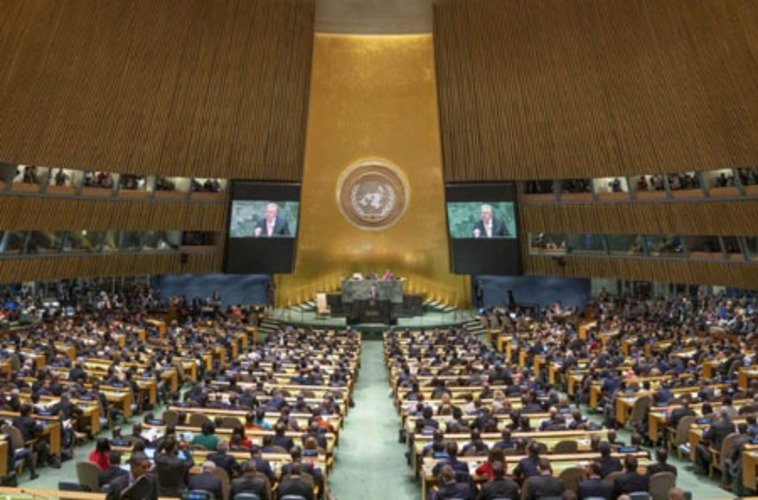 By John J. Metzler
By John J. MetzlerTis the Season of blatant political hypocrisy. This is the point where the UN General Assembly is quickly moving through its agenda items and voting on and adopting a series of draft resolutions relating to human rights and religious freedoms.
It’s all a bit pro forma until you get to the specifics; human rights in Syria and Iran, religious persecution in Myanmar (Burma), and the Russian annexation of Ukraine’s Crimean peninsula. Though any fair minded person would probably admit there’s a serious and endemic human rights problem in places like the Islamic Republic of Iran or Russian-controlled Crimea, there’s a fundamentally different lens through which the majority of UN members view such transgressions.
Iran. Let’s start with Iran. Since the founding of the Islamic Republic in 1979, the human rights violations of this theocratic regime are by this time practically etched in stone! Political and religious repression, gender discrimination and inequality under the law define Teheran’s system.
A vote supporting the resolution passed 79-32-64, through a powerful coalition of the United States, the European Union states such as France, Germany and the United Kingdom, joined Israel, Japan and South Korea to pass the resolution. But here’s where it gets interesting among the No votes; China, Russia and Syria predictably backed Iran as did countries like Afghanistan, Iraq, Lebanon, Indonesia, Pakistan and the Philippines.
And abstentions are interesting too; Egypt, Ethiopia and Nigeria.
Teheran holds political and commercial clout despite its human rights transgressions and thus elicits support or at least acquiescence.
Syria. Syria was a throughly nasty place long before the so called Arab Spring a decade ago which made it worse. A vote of 99-13-61 saw the Assembly send a strong rebuke to the Syrian regime. On the Yes side the USA, Canada and the Europeans were joined by key Arab states such as Kuwait, Jordan, Morocco and Saudi Arabia. The 13 No's included the hard authoritarian states such as China, Cuba, Belarus, Venezuela and Zimbabwe.
The 61 Abstentions brought the usual hint of intended ambiguity mixed with often quiet support or acquiescence such as Egypt, Lebanon, Libya and Malaysia.
Myanmar. Let’s view human rights for Rohingya Muslims and other minorities in Myanmar (Burma). There’s a sound condemnation of 131-9-31 with a wide swath of political support both from Western powers such as the United States, Canada, the Europeans, South Korea as well as the Islamic world from Afghanistan, Egypt, Indonesia, Iran, Iran, Pakistan, Saudi Arabia and Sudan.
The 9 No’s form the bedrock of authoritarian rejectionists; ranging from Burma’s longtime political patron China to Belarus, the Philippines, Russia and Zimbabwe. Why does the Manila government choose to be in such company?
Abstentions are curious group too with even India, Japan, North Korea, Sri Lanka, Singapore, Thailand and Venezuela. Interestingly neither Cuba nor Nicaragua even chose to vote at all.
Crimea. Human rights in the Crimea, the Ukrainian peninsula annexed and subsequently occupied by Russia in 2014 are oft forgotten. Despite the polite protests by the Obama Administration, the Russians held a “referendum” and naturally got the result they wanted. Here, the UN the vote was a more “nuanced” 63-22-85.
Those supporting the resolutions included the USA and Canada, the Europeans, Australia, Japan, and Turkey. Among the 22 opposing the document included obviously Russia, and China, Belarus, Cuba, Eritrea, India, Iran, Nicaragua, North Korea, the Philippines, Syria, Venezuela and Zimbabwe. But the Philippines?
Among the 85 abstentions include a grand list of those not wishing to offend Moscow; Egypt, South Africa and South Korea. But this is really interesting; Latin American countries largely abstained, Argentina, Bolivia, Brazil, Chile, Colombia , Mexico, Paraguay, Peru, and Uruguay.
Most countries engage in political rationalization on some level, Japan abstains on Myanmar because of business and significant aid programs; despite recent closer ties to Washington, India still retains a Russian tilt in many specific policy issues such as Crimea.
But the Philippines chooses not to condemn Islamic Iran, Myanmar, nor Russia thus setting a laughably low bar of either pure rationalization or active collaboration with tyranny. In recent years, Philippine President Rodrigo Duerte who describes himself as a socialist and populist has tilted towards Russia and China and away from longtime ally the United States. This represents a dangerous deterioration in a key East Asian state once unfailingly close to the U.S.
Though these UN condemnations won’t change any policies or suffering in the short term, they indicate notable and often curious political trends worth watching and closely monitoring.
John J. Metzler is a United Nations correspondent covering diplomatic and defense issues. He is the author of Divided Dynamism the Diplomacy of Separated Nations: Germany, Korea, China (2014).
Free Press International




